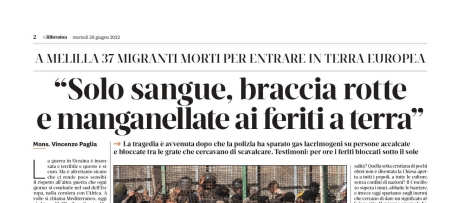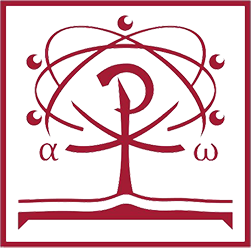Melilla: killed because of their hope

The war in Ukraine is senseless and terrible, that is a fact. But it is also a fact that it makes us insensitive to the other war that is being fought every day in the south of Europe, on the border with Africa. Sometimes it happens in the Mediterranean, today it happened in Melilla, the border between Morocco and Spain, which is also the border between slavery and freedom. Those dead in this war are buried in small paragraphs in the least important pages of a newspaper. This is wrong, tragic, shameful: we are talking about human beings, killed because of their hope, people who did not “die of hope” at sea which is already very serious. No. In this case they were killed! The chronicle of what happened last Friday on the Spanish-Moroccan border, in the enclave of Melilla, is horrific. Reports say that at least 37 people died last Friday in Morocco - but the death toll is set to rise - in a mass attempt to enter Melilla.
As the Spanish newspaper "El Pais" wrote, "when the tragedy occurs on the Moroccan side, there is less transparency, information is limited and difficult to evaluate."
Today the war in Ukraine occupies all the pages of newspapers and television debates that are more and more repetitive, and it keeps us from seeing what lies beyond the Europe we have built and in which we live. Meanwhile the rest of the world looks at the European continent, looks at the civilization we have been able to build throughout history, and seeks help. As we have said many times, migrants do not take away our jobs, they do not "steal" our women, they do not threaten our well-being. They ask for help to improve their living conditions and integrate on the continent. A continent, let it be said incidentally, that is experiencing a birth rate crisis, so staying within closed borders makes no sense. The movements of history never stop. Is it necessary to recall the Roman Empire? Its armies did not stop the barbarian tribes pressing up against its frontiers. On the contrary, the emperors made the barbarians join the army, to try to integrate them, but later the course of history took a different turn. And aren’t we modern Europeans heirs to a Greco-Roman civilization first and then a Christian one, with a clear and fundamental universality? Does not the Catholic Church mean universality? Has not that Christian sect composed of a few Jews become the Church open to all peoples, all cultures, without boundaries of nations? The Crucified overcomes walls, breaks down barriers. Today, however, we fire on helpless people who are trying to give meaning to their lives. The Spanish government condemned the incident, stressing that the "blame" lay with human traffickers.
There is no need now to apportion responsibility and blame. Rather, I think the first task of each of us - clergymen, politicians, citizens - is to look at others as human beings, such as we are, with legitimate desires and hopes for a better life. And we must give answers. These and other deaths cannot be tolerated. These people are our brothers and sisters killed because of their hope. We need to change the perspective with which to look at today's events and ask ourselves how we want our future to be. I have written in this newspaper (and elsewhere) that the conflict in Ukraine must end. Of course, but not just that: all conflicts must end because the very idea that there are conflicts plunges the whole world into a "piecemeal World War III" abyss, as Pope Francis rightly said. And no one will come out of it unscathed.
In Rome in the fifth century of the Christian era, the senators and the population proudly thought that the mighty city walls would defend them from the barbarians. Instead, the barbarians arrived and there ended an era, as witnesses to those events wrote, including - for example - an extraordinary St. Augustine. We now find ourselves at another turning point in history but we must show that we have learned, that we are wiser and more aware. Today we have mighty tools at our disposal to build peace: we have the thought of the great ideas of freedom, justice, fraternity, we have international institutions, legal instruments, the Christian teaching summarized and collected by the encyclical Fratelli Tutti and a theology that aims to combine ethics with the Social Doctrine. So let us stir consciences and take a step forward: Melilla, like Ukraine, like the forgotten and hidden wars, must tell the story of mankind that rejects conflict and violence and embraces mankind itself.
Vincenzo Paglia
(Original text: Italian. Copyright: Il Riformista, June 28 2022 - p. 1-3. Reduction by Fabrizio Mastrofini; transaltion by Leonardo Stefanucci)



